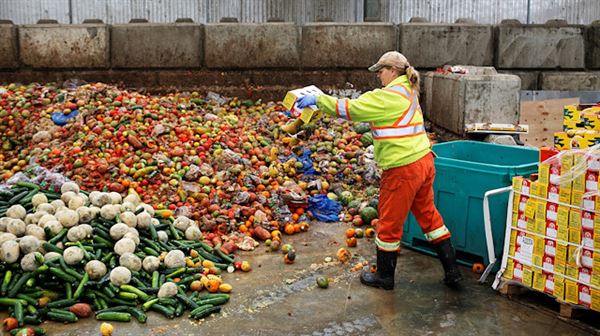If food waste was a country, it would be the third-largest emitter of greenhouse gases, said a UN official. "One third of all food that we consume --
If food waste was a country, it would be the third-largest emitter of greenhouse gases, said a UN official.
“One third of all food that we consume — that is 1.3 billion tons for a year — is lost or wasted,” Ovais Sarmad, deputy executive secretary of the UN Framework Convention on Climate Change (UNFCCC), said Friday at the second International Zero Waste Summit in Istanbul.
During the summer this year — the hottest ever recorded — he said some 179 billion tons of ice melted in July.
“We have a very short time period to address the growing threat of climate change,” he stressed, adding climate change has become the biggest threat to the survival of societies.
Touching on the “contribution” of waste resources to climate change, he said there is a “direct” link between the two.
Scientists from the Intergovernmental Panel on Climate Change (IPCC) “have indicated and proven that 3% of global emissions are directly attributed to waste management. Three percent might not sound like a big number, but the impact of that is enormous,” he added.
Underlining that waste is generated everywhere in societies, including in homes, offices and industries, he said the world should change its practices which have led to the production of 2.1 billion tons of waste per year.
Speaking on opportunities and challenges towards this goal, he stressed that reusing and recycling resources had huge economic and social benefits.
“The potential of the circular economy and zero waste concepts can help us address many challenges,” he said, adding recycling waste could generate millions of dollars.
– ‘Turkey’s zero waste step is very important’
Praising Turkey’s zero waste project, led by first lady Emine Erdogan, Sarmad said the country’s regulation of zero waste was a “very” important step moving it towards sustainable development goals and growth.
“I hope Turkey will share this experience and share this knowledge with other countries,” he said, adding innovation was taking an important lead in Turkey.
For Turkey’s actions against the impacts of climate change, he praised the Turkish government and first lady.
“We have a tremendous challenge ahead of us, the challenge of preserving our habitat for future generations,” he added.
Emine Erdogan said everyone in the world had a responsibility to tackle the negative effects of climate change.
“Neither plastic occupied oceans nor water wars nor famine is our destiny,” she stressed.
Referring to the textile sector as the second most polluting industry worldwide, she said the production of one pair of jeans released the same amount of pollution as an 80-mile trip in an automobile.
“Plastic package waste was over 3 million tons in total in 2017. Total package waste reached over 8.5 million tons,” she said.
Turkey’s zero waste project aims to reduce the volume of non-recyclable waste. The project is also listed in the Environmental Performance Review of the Organization for Economic Co-operation and Development (OECD).
Public institutions and organizations will shift to a zero waste management system on June 1, 2020, as will metropolitan district municipalities with populations over 250,000 on Dec. 31, 2020.
